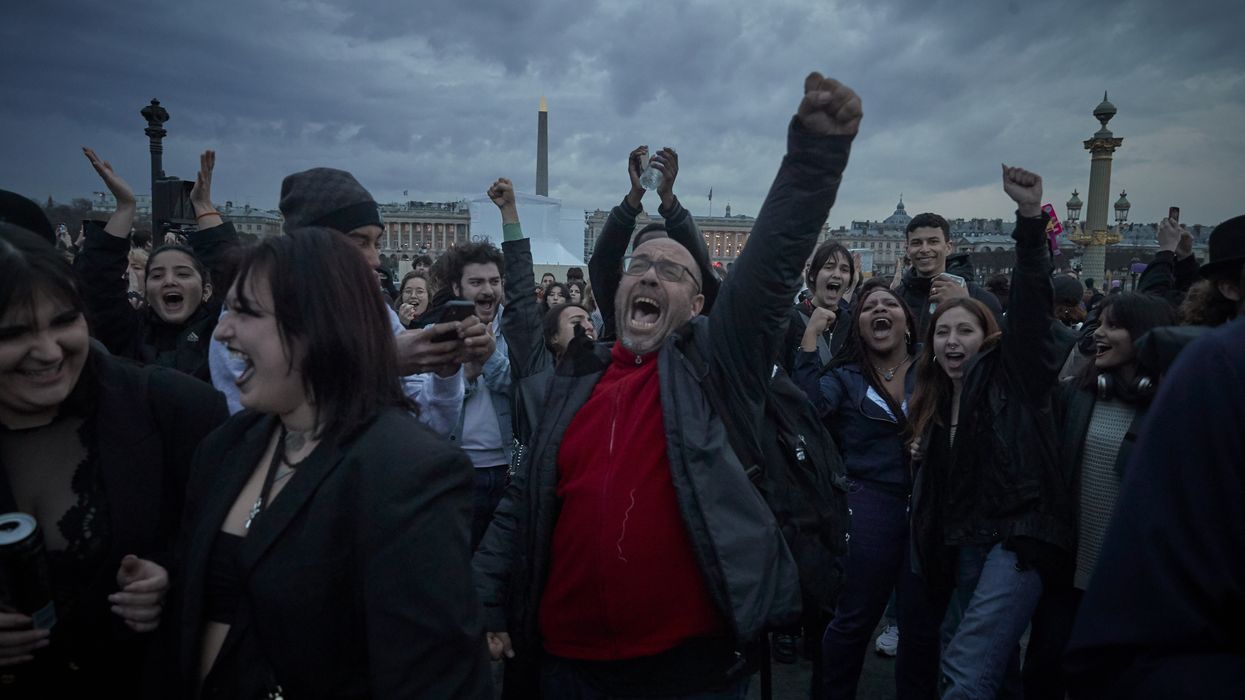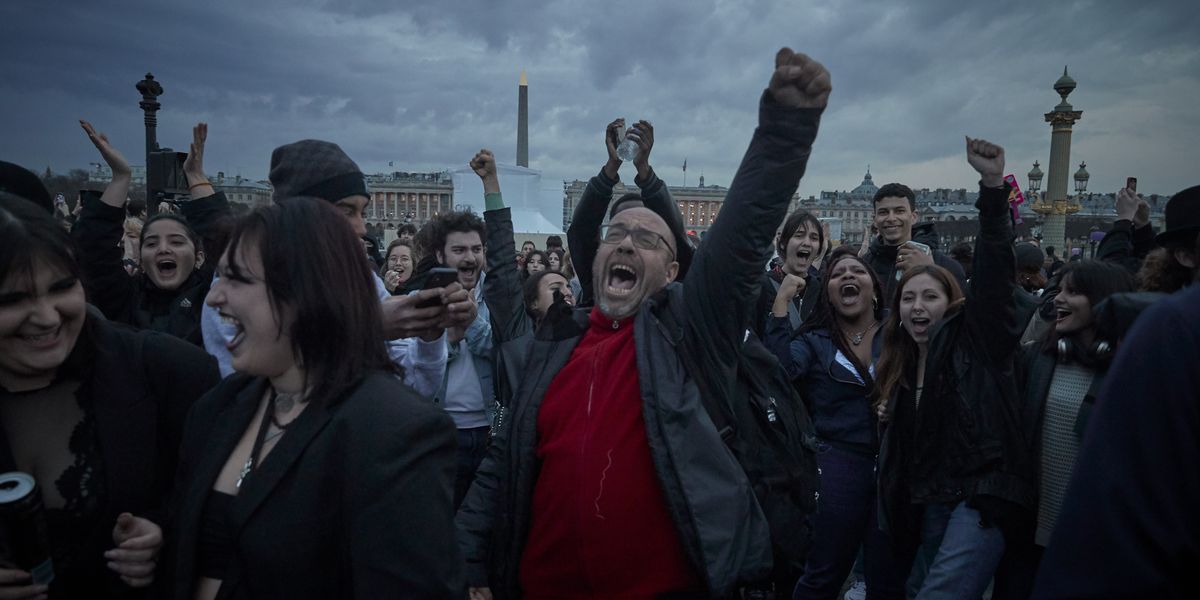
French workers currently live nearly two years longer than their counterparts in member states in the Organization for Economic Co-operation and Development (OECD), composed of roughly the world’s most advanced capitalist countries. Further, they retire with full benefits, on average, nearly three years earlier than their counterparts in the OECD. Thanks to a rich history of militant struggle for a shorter workweek, a greater share of national wealth, and social benefits for retirees, workers in France enjoy a higher standard of living and a much longer secure retirement than most workers in other countries.
Of course, a better, longer, more secure life comes at a cost; France devotes much more of its GDP to support retirees than other OECD countries. It should be an obvious truth that it costs more to live longer.
And the people of France want to keep this system and improve it. They believe that spending more national wealth on the people is sensible and just.
With the President of France, Emmanuel Macron, and his corporate backers threatening to raise the retirement age by two years, the opinion polls consistently show that the vast majority of those polled oppose the change.
To bring this opinion to the attention of France’s elites, two million people rallied and marched throughout France on Thursday, January 19; in Paris alone, the march extended for two and a half miles.
Rather than bow down to the demands for austerity and competitiveness made by capital, working people in France are fighting to retain what earlier generations have won. They do not see the fate of the elderly as negotiable.
Instead, the people defend senior benefits as an act of solidarity and not charity.
By delaying retirement benefits for two years and shortening the retirements of French workers, politicians believe that they could save as much as 150 billion dollars per year. Of course, this “savings” will never benefit working people.
However, it is thievery with the stolen national wealth redirected toward shoring up the fortunes of the ruling class.
The day after the massive demonstrations, President Macron announced that his administration planned to increase French spending on the military by 115-120 billion dollars per year over the next six years! So the proposed savings will go into the pockets of the armament industry and further increase the tensions in Europe unleashed by the war in Ukraine.
Since the consolidation of nation-states, rulers have used war and the threat of war to rally support. Not only is the war in Ukraine a reckless step toward regional, if not global, war, but the governing cliques are using it to justify their hold on power. Military spending is exploding across the region. Fear of a mythical Russian march to the sea serves the interest of all of the capitalist powers in the Euro-Atlantic area.
As it was in the twentieth century, war is the answer to the collapse of the traditional parties; war is the distraction from the inability of the center forces to rule effectively; war is the answer given to the masses searching for political alternatives to the misrule of the few.
But if the majority of French voters oppose Macron’s initiative, how did he get reelected? He never hid his agenda from the people. If sixty to eighty percent of the voters oppose his policies, what is the secret of his electoral victory?
Macron’s election was the result of the dilemma presented to voters in nearly all of the so-called “advanced democracies” — those countries organized around mature capitalist economic relations, but governed by a parliamentary system with nominally universal suffrage.
Where these countries exist– especially the US and Europe, but others as well– voters must choose between two ugly options. They can support political parties that have abdicated social welfare for the individualistic, winner-take-all “justice” of the market. Or, on other hand, they can opt for the bogus anti-elitist populism of the refashioned right.
Understandably, many voters have turned against traditional parties that have been won over to “serving” social justice through the mechanism of private firms, NGOs, foundations, and charitable institutions. The US Democratic Party, UK Labour, the German SPD, Italy’s Democrats, etc. have abandoned their traditional posture of partisanship for the working class and surrendered to the philosophy of “a rising tide lifts all boats” — the politics that is dismantling the welfare state safety net.
With the traditional center-left disregarding the working class and with working people slammed by a global shift in wealth distribution, a privatization and dismantling of public infrastructure, and a radical restructuring of employment away from high-paying jobs, voters are looking for alternatives.
Sections of the traditional right– refashioned to attack indifferent elites, construct handy scapegoats, and offer easy, but misdirected solutions– have rushed to fill the political void. Politicians like Trump, Boris Johnson, Orbán, Le Pen, Meloni have opportunistically capitalized upon the vacuum left by the mutation of the center-left parties. Their faux-populism captured much of the forgotten working class, desperate for an alternative, any alternative.
As the traditional center-left lost ground, it raised the alarm of extremism, even fascism. Like the bourgeois parties of the past, the mainstream parties resort to fear-mongering, rather than a critical examination of their trajectory, their departure from their purported advocacy for the masses. Whether it was touting the danger of the ultra-right or trumpeting the emergence of fascism, the center-left sought to rally voters around a united front against Trump, Le Pen, Meloni, et al., a solely defensive strategy that, at best, only forestalled the continuing influence of right-wing populism.
It is in this context, following this cautious, defensive strategy, that Macron won re-election. Against the rise of the right-populist National Rally party and its presidential candidate, Marine le Pen, the traditional French parties– including the center-left and the new left– unconditionally threw their support behind the “safe” alternative. The left neither sought nor received any major concessions from Macron for their votes. While they drew some satisfaction from stopping Le Pen, the left now faces a Macron determined to strip the working class of hard-won gains, ironically, a move that Le Pen does not support.
Those on the left who embrace the tactic of unconditional unity against the right as an electoral strategy should take a hard, sober look at how it played out in France. Happily, millions of French citizens are rising to the challenge now posed by rallying behind a “lesser of two evils,” a “lesser” that may prove far more destructive of living standards than the “other evil.”
As history all too often proves, giving voters something to vote against can, at best, temporarily retard the advance of the false friends of the people. Decades of fealty to the “lesser evil” myth has only spawned an ever more skeptical, cynical, frustrated electorate, desperate for an alternative. Absent a left that stands for something, voters will continue to consider faux-populism as a legitimate alternative.
First published at Marxist-Leninism Today.The post
France and the Dilemma of Electoral Politics in the 21st Century first appeared on
Dissident Voice.
This post was originally published on Dissident Voice.







 Kevin s’approche de Port-Vila
Kevin s’approche de Port-Vila 




